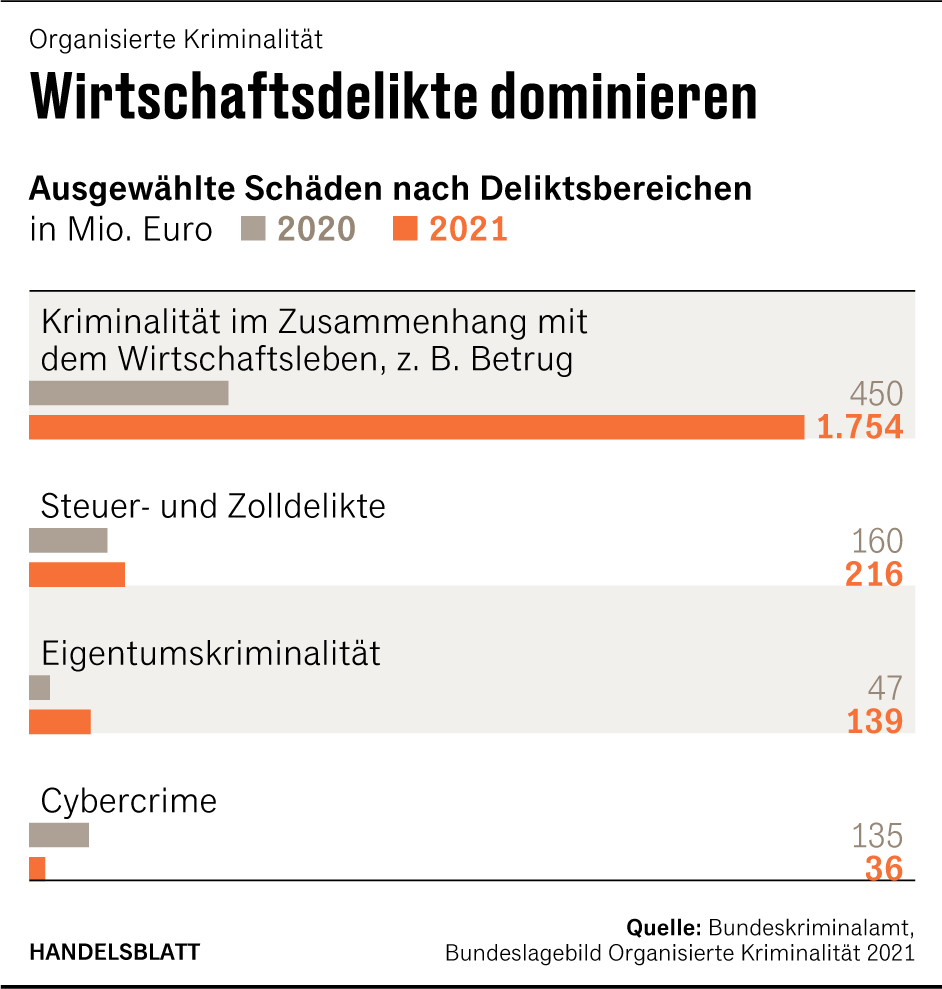The Federal Minister of the Interior wants significantly more powers for the authorities in the fight against organized crime.
(Photo: dpa)
Berlin Federal Interior Minister Nancy Faeser (SPD) is pushing for significantly more powers for the authorities in the fight against organized crime. This emerges from a strategy paper that the minister intends to present today, Wednesday, at the fall conference of the Federal Criminal Police Office in Wiesbaden.
The paper, which is available to the Handelsblatt, lists a total of 19 measures intended to “sustainably smash criminal structures and consistently skim off incriminated profits”. Faeser sees an urgent need for action.
Because with the actions of the criminal groups, the paper says, there is a risk of “undermining state and economic structures and destabilizing society as a whole”. Therefore, countermeasures must now be taken “jointly and decisively” at national and international level.
For example, Faeser wants to simplify the confiscation of illegally acquired assets. The minister has her sights set on assets of unclear origin. According to the paper, rapid and effective action is only possible if assets can be assigned to specific individuals and companies. As a solution, Faeser proposes a state right to information and a preventive freezing of suspicious assets.
Top jobs of the day
Find the best jobs now and
be notified by email.
This means that the state should be given the power to demand information about assets that show certain risk characteristics as to where the assets come from and who exercises actual control over them. “If information is not provided or if it cannot be convinced that the information provided is correct, this right must be combined with the possibility for the competent authorities to take further measures and, ultimately, to confiscate the assets.”
Faeser wants “the immediate introduction” of the cash limit
Faeser also expects benefits from a general upper cash limit of less than 10,000 euros. The minister brought this measure into play for the first time at the weekend.
Now “the immediate introduction” of the cash limit, as their strategy paper puts it, is mentioned as another tool in the fight against organized crime. Restricting cash transactions reduces the risk of “obscuring the origin of large assets by making large transactions through traceable financial channels”.
The EU Commission had already made the proposal last year to only allow cash payments up to a maximum of 10,000 euros, apart from a few exceptions – as part of a package of measures against money laundering. In some EU countries there are already upper limits for cash payments – unlike in Germany, where such a regulation has been a controversial issue for years.
The storage of IP addresses of computers in order to grant investigators access in case of doubt is also controversial. This search method is also in the strategy paper. In September, the European Court of Justice set strict limits on the storage of telecommunications data to investigate criminal offenses in Germany. The judges ruled that the currently suspended data retention regulation in Germany was incompatible with EU law.
>> Read here: Financial supervisor Birgit Rodolphe: “Combating money laundering is like raising children”
Faeser considers access to telecommunications data to be “indispensable” for investigating criminal offenses, as the paper states. It should therefore be thoroughly examined “which options are available so that telecommunications data can be kept in compliance with the law in order to be able to act consistently in the fight against serious and organized crime and other serious crimes”.
From the point of view of the Ministry of the Interior, mandatory storage of IP addresses and port numbers is “often the only approach to determining the identity of perpetrators of serious crimes who move anonymously on the Internet”.
Stronger action against money laundering with cryptocurrencies
The Interior Minister also wants to take stricter action against money laundering with cryptocurrencies such as Bitcoin. The Federal Criminal Police Office (BKA) will therefore set up a “Competence Center for Digital Financial Investigations”. There, complex virtual payment systems are to be analyzed, tested and evaluated. In addition, an “expert network money laundering crypto assets” should be set up in order to “significantly” support investigations in the federal and state governments with the appropriate know-how.
For the ministry, the need for action is obvious, since a wide variety of procedures have been developed “at high speed” in the crypto sector to conceal the origin of assets. Therefore, further expertise must be built up among the law enforcement and investigative authorities.
More: Cash limit is getting closer – Lindner expects a limit of 10,000 euros


